Organisational Behaviour Report: Leadership and Employee Behaviour
VerifiedAdded on 2021/01/02
|16
|4885
|78
Report
AI Summary
This report on organisational behaviour analyzes the influence of culture, politics, and power on employee behaviour within an organisational context, specifically focusing on 4Com Plc. It explores Handy's typology, Hofstede's cultural dimensions, and French and Raven's power types, examining how these factors shape the work environment. The report then delves into content and process theories of motivation, including Maslow's hierarchy of needs, Herzberg's theory, and expectancy theory, and how these theories enable effective achievement of goals. It also contrasts effective and ineffective teams, providing insights into team dynamics. Finally, the report applies these concepts to a given business situation, offering practical applications of organisational behaviour principles and providing a comprehensive overview of the factors impacting employee performance and organisational success.
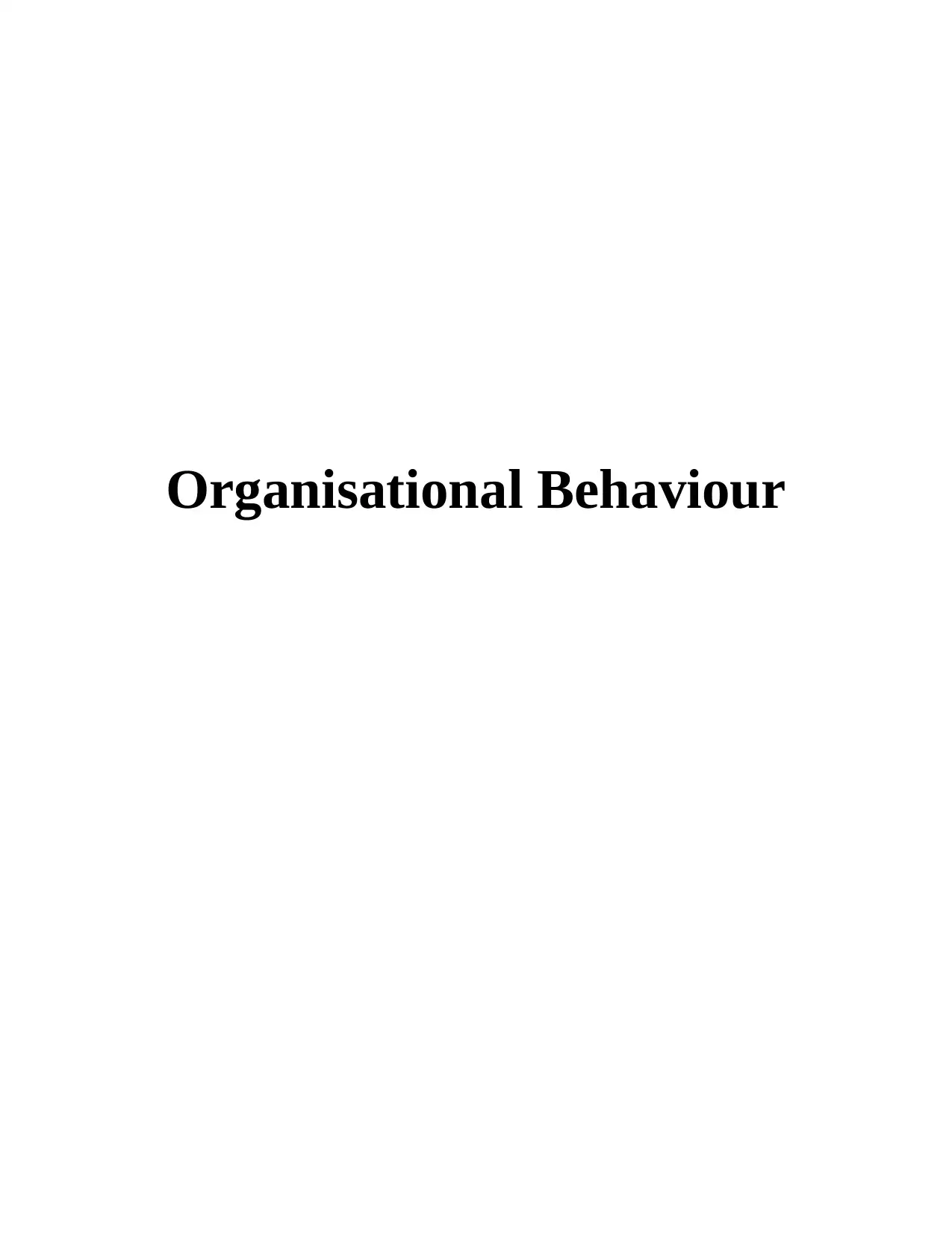
Organisational Behaviour
Paraphrase This Document
Need a fresh take? Get an instant paraphrase of this document with our AI Paraphraser
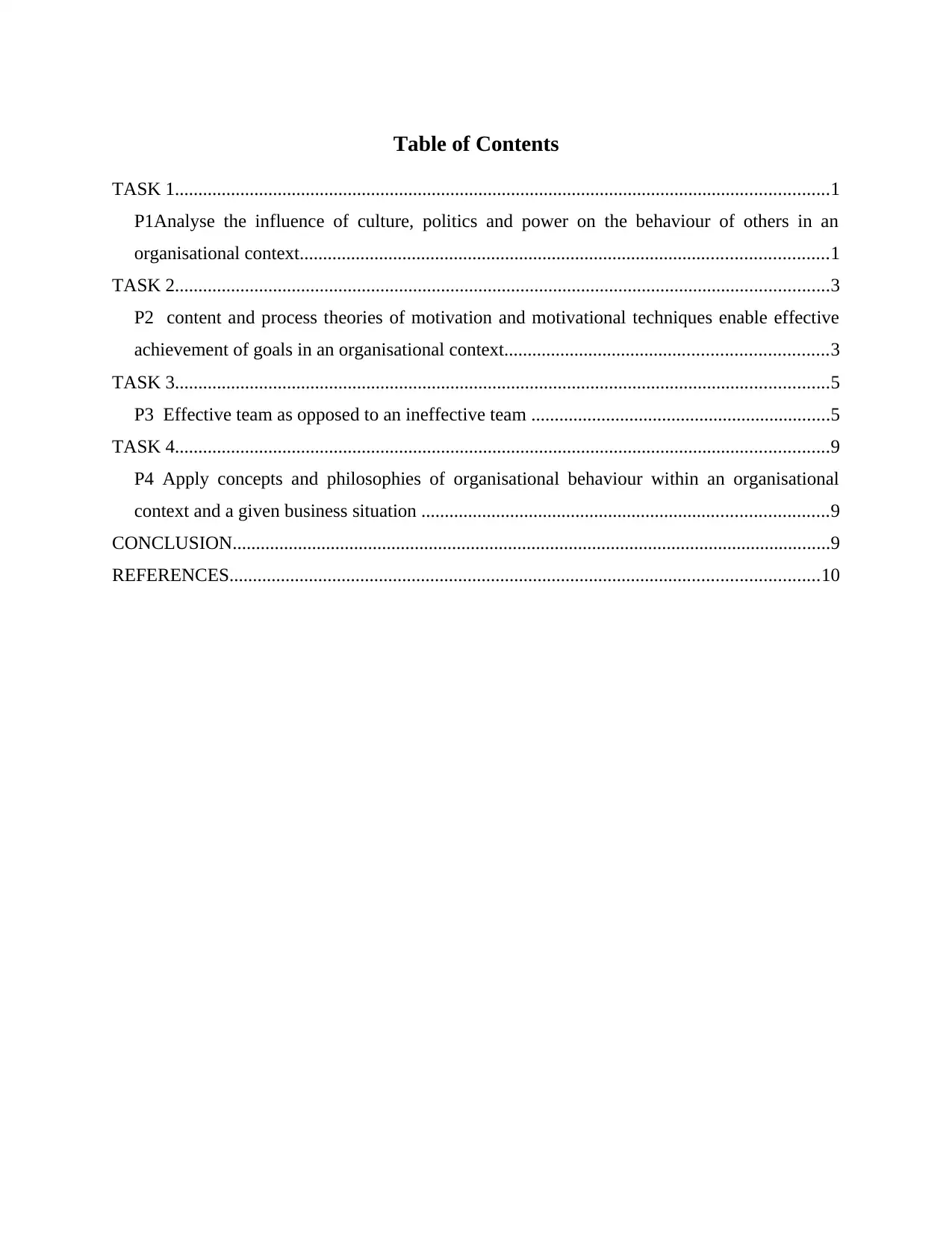
Table of Contents
TASK 1............................................................................................................................................1
P1Analyse the influence of culture, politics and power on the behaviour of others in an
organisational context.................................................................................................................1
TASK 2............................................................................................................................................3
P2 content and process theories of motivation and motivational techniques enable effective
achievement of goals in an organisational context.....................................................................3
TASK 3............................................................................................................................................5
P3 Effective team as opposed to an ineffective team ................................................................5
TASK 4............................................................................................................................................9
P4 Apply concepts and philosophies of organisational behaviour within an organisational
context and a given business situation .......................................................................................9
CONCLUSION................................................................................................................................9
REFERENCES..............................................................................................................................10
TASK 1............................................................................................................................................1
P1Analyse the influence of culture, politics and power on the behaviour of others in an
organisational context.................................................................................................................1
TASK 2............................................................................................................................................3
P2 content and process theories of motivation and motivational techniques enable effective
achievement of goals in an organisational context.....................................................................3
TASK 3............................................................................................................................................5
P3 Effective team as opposed to an ineffective team ................................................................5
TASK 4............................................................................................................................................9
P4 Apply concepts and philosophies of organisational behaviour within an organisational
context and a given business situation .......................................................................................9
CONCLUSION................................................................................................................................9
REFERENCES..............................................................................................................................10
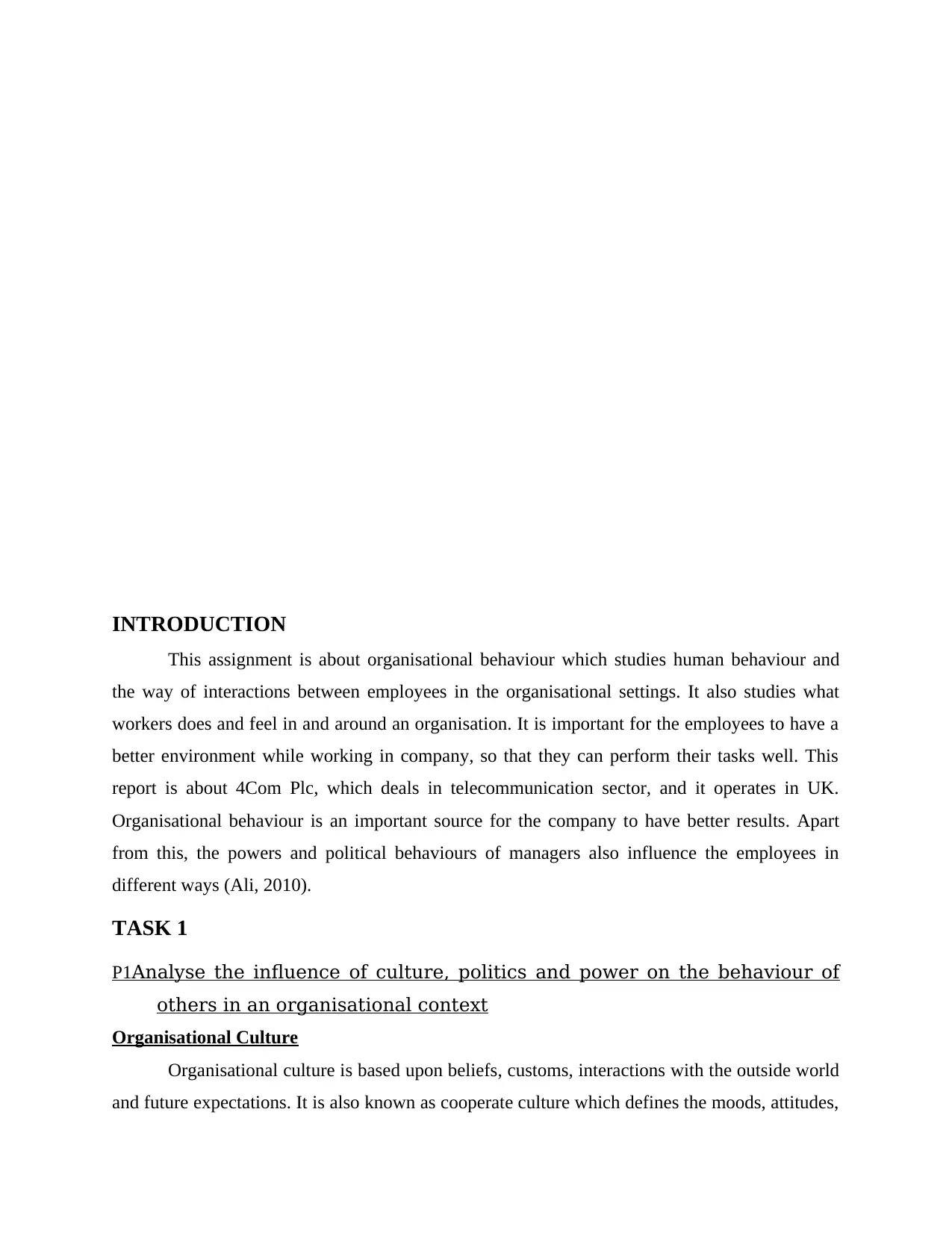
INTRODUCTION
This assignment is about organisational behaviour which studies human behaviour and
the way of interactions between employees in the organisational settings. It also studies what
workers does and feel in and around an organisation. It is important for the employees to have a
better environment while working in company, so that they can perform their tasks well. This
report is about 4Com Plc, which deals in telecommunication sector, and it operates in UK.
Organisational behaviour is an important source for the company to have better results. Apart
from this, the powers and political behaviours of managers also influence the employees in
different ways (Ali, 2010).
TASK 1
P1Analyse the influence of culture, politics and power on the behaviour of
others in an organisational context
Organisational Culture
Organisational culture is based upon beliefs, customs, interactions with the outside world
and future expectations. It is also known as cooperate culture which defines the moods, attitudes,
This assignment is about organisational behaviour which studies human behaviour and
the way of interactions between employees in the organisational settings. It also studies what
workers does and feel in and around an organisation. It is important for the employees to have a
better environment while working in company, so that they can perform their tasks well. This
report is about 4Com Plc, which deals in telecommunication sector, and it operates in UK.
Organisational behaviour is an important source for the company to have better results. Apart
from this, the powers and political behaviours of managers also influence the employees in
different ways (Ali, 2010).
TASK 1
P1Analyse the influence of culture, politics and power on the behaviour of
others in an organisational context
Organisational Culture
Organisational culture is based upon beliefs, customs, interactions with the outside world
and future expectations. It is also known as cooperate culture which defines the moods, attitudes,
⊘ This is a preview!⊘
Do you want full access?
Subscribe today to unlock all pages.

Trusted by 1+ million students worldwide
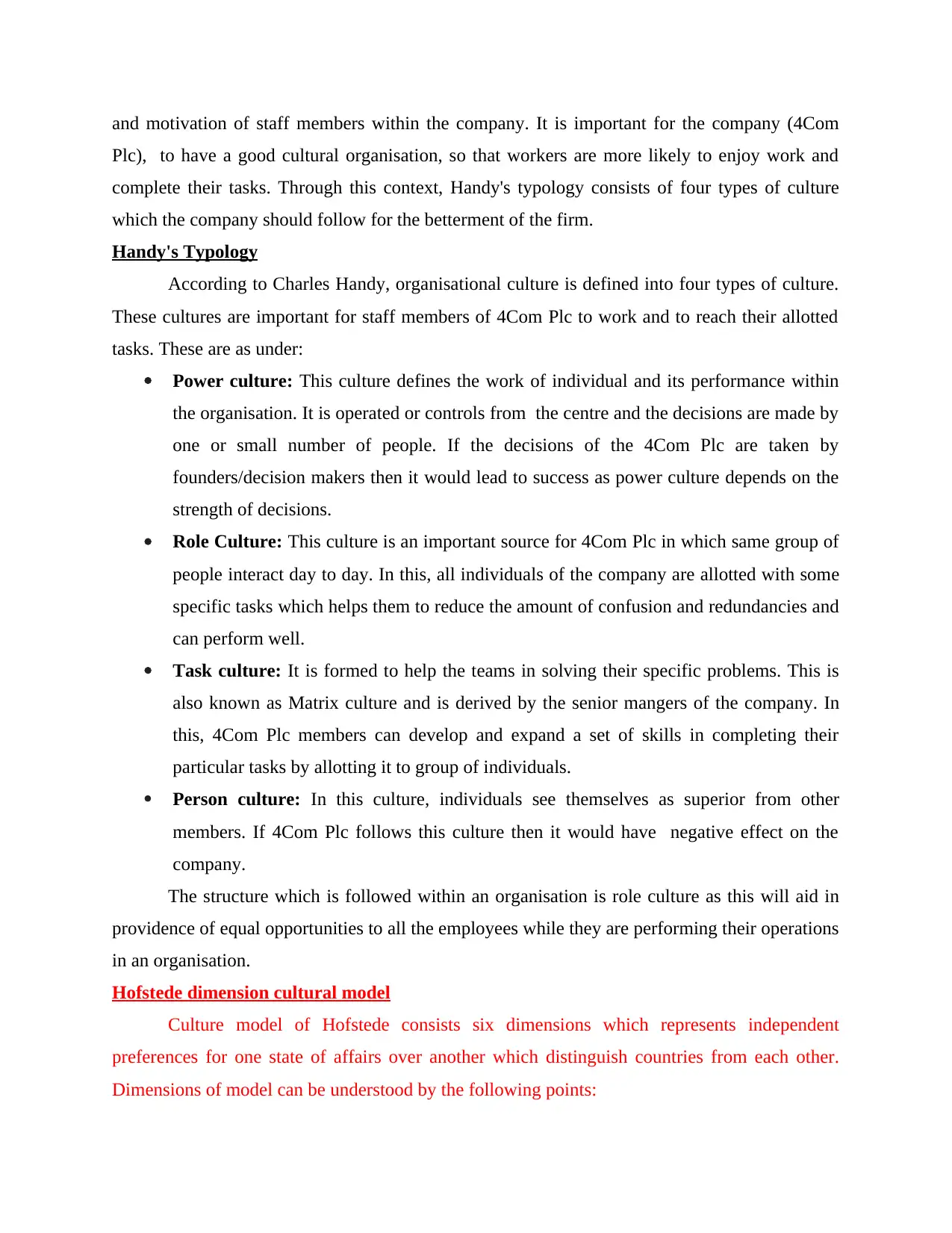
and motivation of staff members within the company. It is important for the company (4Com
Plc), to have a good cultural organisation, so that workers are more likely to enjoy work and
complete their tasks. Through this context, Handy's typology consists of four types of culture
which the company should follow for the betterment of the firm.
Handy's Typology
According to Charles Handy, organisational culture is defined into four types of culture.
These cultures are important for staff members of 4Com Plc to work and to reach their allotted
tasks. These are as under:
Power culture: This culture defines the work of individual and its performance within
the organisation. It is operated or controls from the centre and the decisions are made by
one or small number of people. If the decisions of the 4Com Plc are taken by
founders/decision makers then it would lead to success as power culture depends on the
strength of decisions.
Role Culture: This culture is an important source for 4Com Plc in which same group of
people interact day to day. In this, all individuals of the company are allotted with some
specific tasks which helps them to reduce the amount of confusion and redundancies and
can perform well.
Task culture: It is formed to help the teams in solving their specific problems. This is
also known as Matrix culture and is derived by the senior mangers of the company. In
this, 4Com Plc members can develop and expand a set of skills in completing their
particular tasks by allotting it to group of individuals.
Person culture: In this culture, individuals see themselves as superior from other
members. If 4Com Plc follows this culture then it would have negative effect on the
company.
The structure which is followed within an organisation is role culture as this will aid in
providence of equal opportunities to all the employees while they are performing their operations
in an organisation.
Hofstede dimension cultural model
Culture model of Hofstede consists six dimensions which represents independent
preferences for one state of affairs over another which distinguish countries from each other.
Dimensions of model can be understood by the following points:
Plc), to have a good cultural organisation, so that workers are more likely to enjoy work and
complete their tasks. Through this context, Handy's typology consists of four types of culture
which the company should follow for the betterment of the firm.
Handy's Typology
According to Charles Handy, organisational culture is defined into four types of culture.
These cultures are important for staff members of 4Com Plc to work and to reach their allotted
tasks. These are as under:
Power culture: This culture defines the work of individual and its performance within
the organisation. It is operated or controls from the centre and the decisions are made by
one or small number of people. If the decisions of the 4Com Plc are taken by
founders/decision makers then it would lead to success as power culture depends on the
strength of decisions.
Role Culture: This culture is an important source for 4Com Plc in which same group of
people interact day to day. In this, all individuals of the company are allotted with some
specific tasks which helps them to reduce the amount of confusion and redundancies and
can perform well.
Task culture: It is formed to help the teams in solving their specific problems. This is
also known as Matrix culture and is derived by the senior mangers of the company. In
this, 4Com Plc members can develop and expand a set of skills in completing their
particular tasks by allotting it to group of individuals.
Person culture: In this culture, individuals see themselves as superior from other
members. If 4Com Plc follows this culture then it would have negative effect on the
company.
The structure which is followed within an organisation is role culture as this will aid in
providence of equal opportunities to all the employees while they are performing their operations
in an organisation.
Hofstede dimension cultural model
Culture model of Hofstede consists six dimensions which represents independent
preferences for one state of affairs over another which distinguish countries from each other.
Dimensions of model can be understood by the following points:
Paraphrase This Document
Need a fresh take? Get an instant paraphrase of this document with our AI Paraphraser
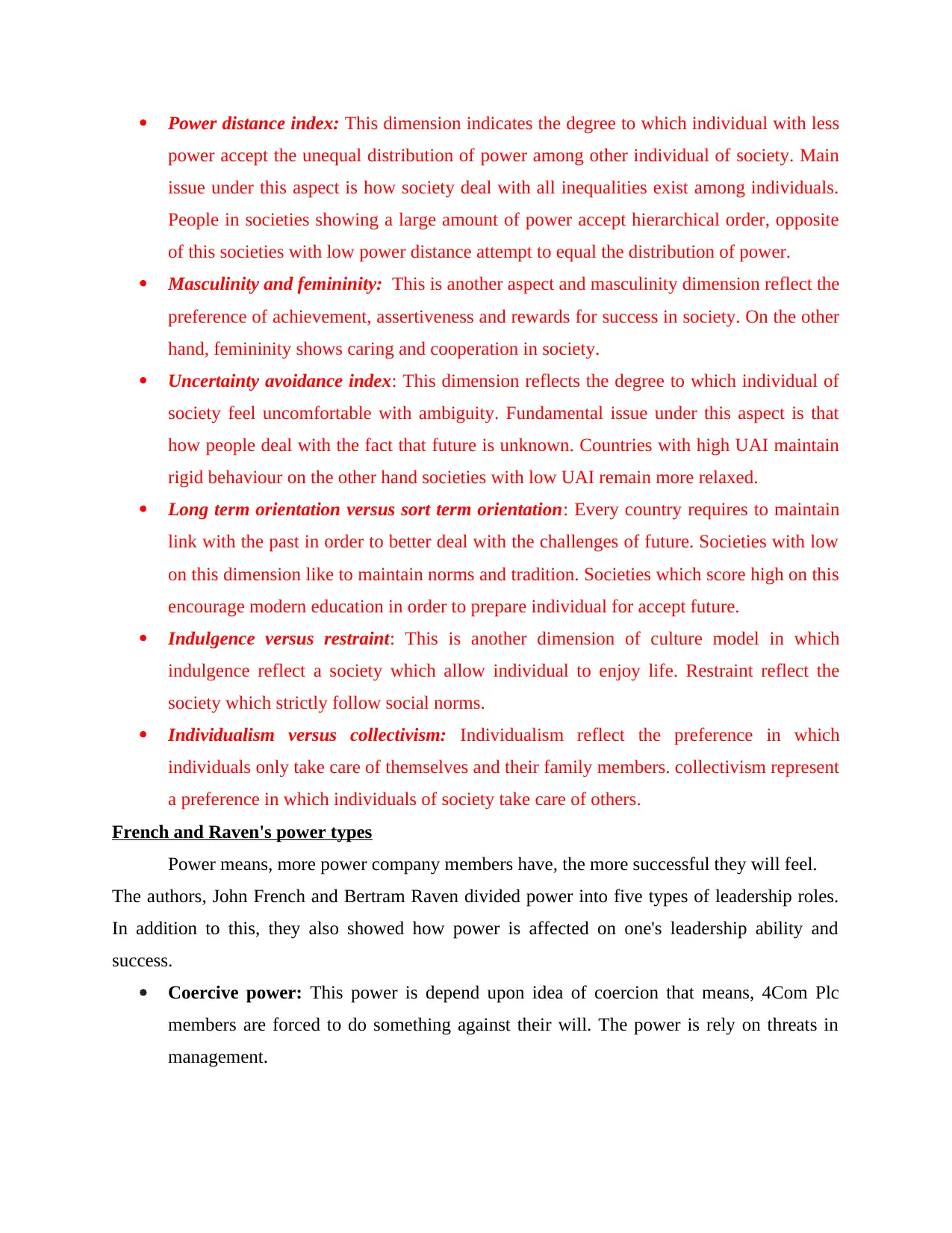
Power distance index: This dimension indicates the degree to which individual with less
power accept the unequal distribution of power among other individual of society. Main
issue under this aspect is how society deal with all inequalities exist among individuals.
People in societies showing a large amount of power accept hierarchical order, opposite
of this societies with low power distance attempt to equal the distribution of power.
Masculinity and femininity: This is another aspect and masculinity dimension reflect the
preference of achievement, assertiveness and rewards for success in society. On the other
hand, femininity shows caring and cooperation in society.
Uncertainty avoidance index: This dimension reflects the degree to which individual of
society feel uncomfortable with ambiguity. Fundamental issue under this aspect is that
how people deal with the fact that future is unknown. Countries with high UAI maintain
rigid behaviour on the other hand societies with low UAI remain more relaxed.
Long term orientation versus sort term orientation: Every country requires to maintain
link with the past in order to better deal with the challenges of future. Societies with low
on this dimension like to maintain norms and tradition. Societies which score high on this
encourage modern education in order to prepare individual for accept future.
Indulgence versus restraint: This is another dimension of culture model in which
indulgence reflect a society which allow individual to enjoy life. Restraint reflect the
society which strictly follow social norms.
Individualism versus collectivism: Individualism reflect the preference in which
individuals only take care of themselves and their family members. collectivism represent
a preference in which individuals of society take care of others.
French and Raven's power types
Power means, more power company members have, the more successful they will feel.
The authors, John French and Bertram Raven divided power into five types of leadership roles.
In addition to this, they also showed how power is affected on one's leadership ability and
success.
Coercive power: This power is depend upon idea of coercion that means, 4Com Plc
members are forced to do something against their will. The power is rely on threats in
management.
power accept the unequal distribution of power among other individual of society. Main
issue under this aspect is how society deal with all inequalities exist among individuals.
People in societies showing a large amount of power accept hierarchical order, opposite
of this societies with low power distance attempt to equal the distribution of power.
Masculinity and femininity: This is another aspect and masculinity dimension reflect the
preference of achievement, assertiveness and rewards for success in society. On the other
hand, femininity shows caring and cooperation in society.
Uncertainty avoidance index: This dimension reflects the degree to which individual of
society feel uncomfortable with ambiguity. Fundamental issue under this aspect is that
how people deal with the fact that future is unknown. Countries with high UAI maintain
rigid behaviour on the other hand societies with low UAI remain more relaxed.
Long term orientation versus sort term orientation: Every country requires to maintain
link with the past in order to better deal with the challenges of future. Societies with low
on this dimension like to maintain norms and tradition. Societies which score high on this
encourage modern education in order to prepare individual for accept future.
Indulgence versus restraint: This is another dimension of culture model in which
indulgence reflect a society which allow individual to enjoy life. Restraint reflect the
society which strictly follow social norms.
Individualism versus collectivism: Individualism reflect the preference in which
individuals only take care of themselves and their family members. collectivism represent
a preference in which individuals of society take care of others.
French and Raven's power types
Power means, more power company members have, the more successful they will feel.
The authors, John French and Bertram Raven divided power into five types of leadership roles.
In addition to this, they also showed how power is affected on one's leadership ability and
success.
Coercive power: This power is depend upon idea of coercion that means, 4Com Plc
members are forced to do something against their will. The power is rely on threats in
management.
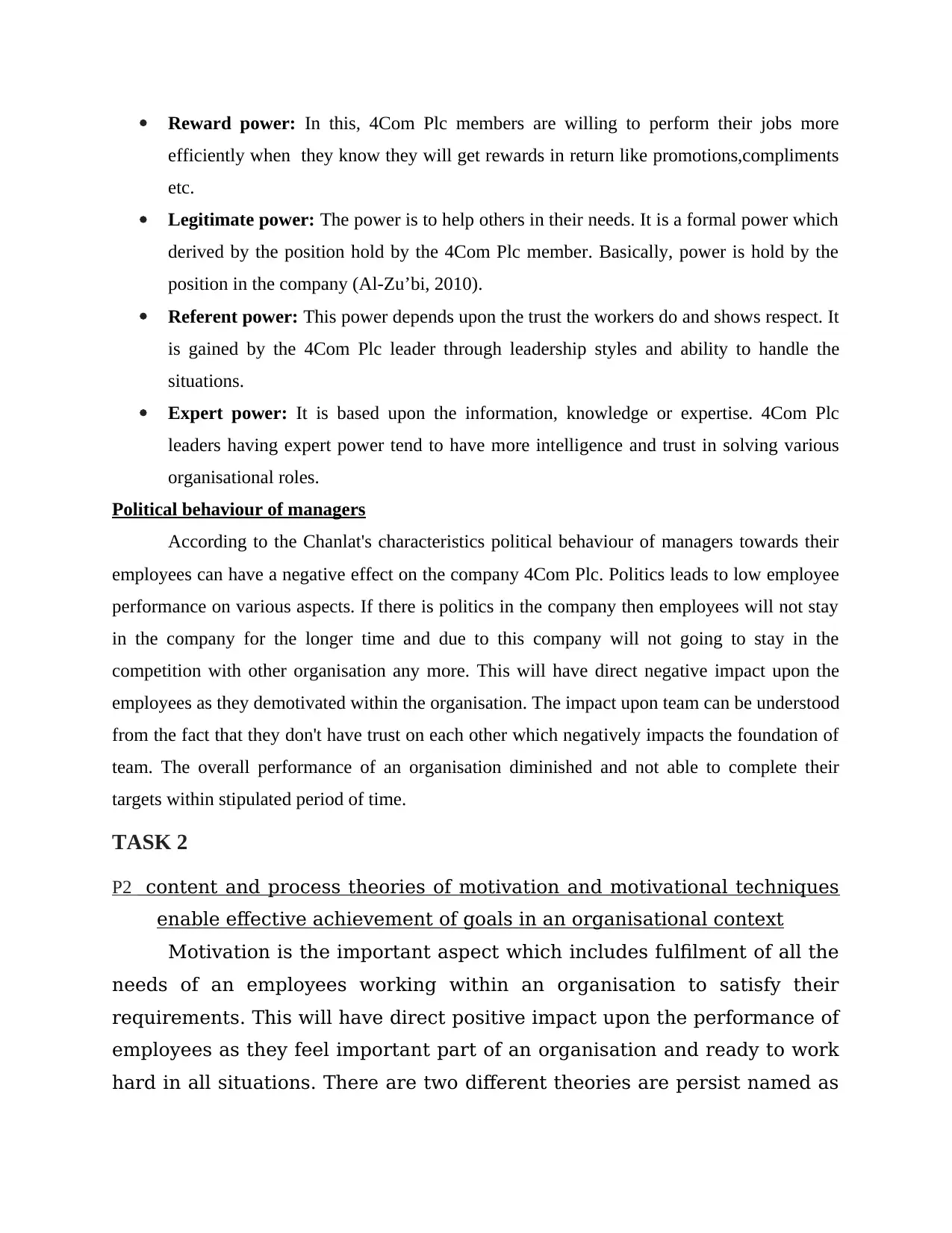
Reward power: In this, 4Com Plc members are willing to perform their jobs more
efficiently when they know they will get rewards in return like promotions,compliments
etc.
Legitimate power: The power is to help others in their needs. It is a formal power which
derived by the position hold by the 4Com Plc member. Basically, power is hold by the
position in the company (Al-Zu’bi, 2010).
Referent power: This power depends upon the trust the workers do and shows respect. It
is gained by the 4Com Plc leader through leadership styles and ability to handle the
situations.
Expert power: It is based upon the information, knowledge or expertise. 4Com Plc
leaders having expert power tend to have more intelligence and trust in solving various
organisational roles.
Political behaviour of managers
According to the Chanlat's characteristics political behaviour of managers towards their
employees can have a negative effect on the company 4Com Plc. Politics leads to low employee
performance on various aspects. If there is politics in the company then employees will not stay
in the company for the longer time and due to this company will not going to stay in the
competition with other organisation any more. This will have direct negative impact upon the
employees as they demotivated within the organisation. The impact upon team can be understood
from the fact that they don't have trust on each other which negatively impacts the foundation of
team. The overall performance of an organisation diminished and not able to complete their
targets within stipulated period of time.
TASK 2
P2 content and process theories of motivation and motivational techniques
enable effective achievement of goals in an organisational context
Motivation is the important aspect which includes fulfilment of all the
needs of an employees working within an organisation to satisfy their
requirements. This will have direct positive impact upon the performance of
employees as they feel important part of an organisation and ready to work
hard in all situations. There are two different theories are persist named as
efficiently when they know they will get rewards in return like promotions,compliments
etc.
Legitimate power: The power is to help others in their needs. It is a formal power which
derived by the position hold by the 4Com Plc member. Basically, power is hold by the
position in the company (Al-Zu’bi, 2010).
Referent power: This power depends upon the trust the workers do and shows respect. It
is gained by the 4Com Plc leader through leadership styles and ability to handle the
situations.
Expert power: It is based upon the information, knowledge or expertise. 4Com Plc
leaders having expert power tend to have more intelligence and trust in solving various
organisational roles.
Political behaviour of managers
According to the Chanlat's characteristics political behaviour of managers towards their
employees can have a negative effect on the company 4Com Plc. Politics leads to low employee
performance on various aspects. If there is politics in the company then employees will not stay
in the company for the longer time and due to this company will not going to stay in the
competition with other organisation any more. This will have direct negative impact upon the
employees as they demotivated within the organisation. The impact upon team can be understood
from the fact that they don't have trust on each other which negatively impacts the foundation of
team. The overall performance of an organisation diminished and not able to complete their
targets within stipulated period of time.
TASK 2
P2 content and process theories of motivation and motivational techniques
enable effective achievement of goals in an organisational context
Motivation is the important aspect which includes fulfilment of all the
needs of an employees working within an organisation to satisfy their
requirements. This will have direct positive impact upon the performance of
employees as they feel important part of an organisation and ready to work
hard in all situations. There are two different theories are persist named as
⊘ This is a preview!⊘
Do you want full access?
Subscribe today to unlock all pages.

Trusted by 1+ million students worldwide
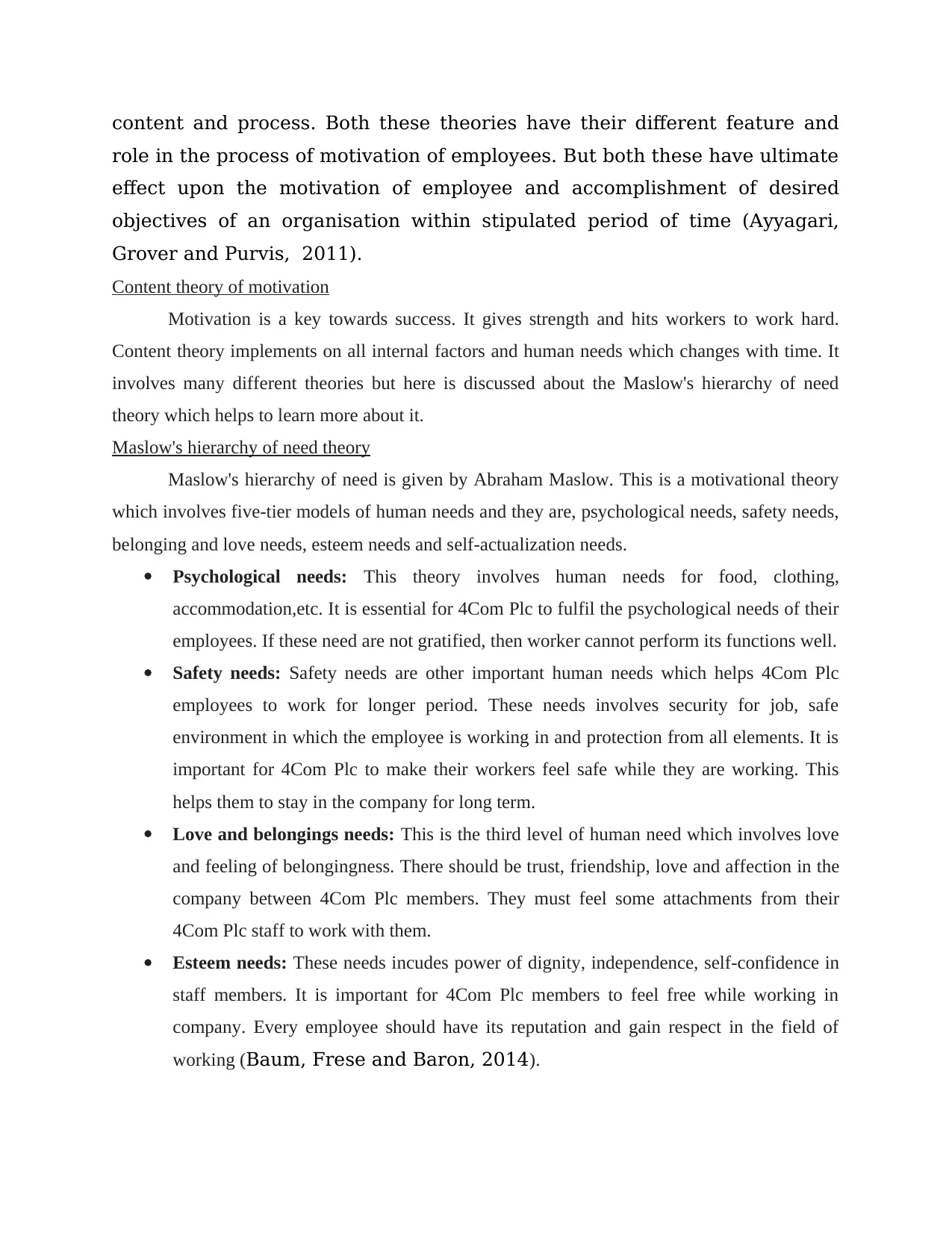
content and process. Both these theories have their different feature and
role in the process of motivation of employees. But both these have ultimate
effect upon the motivation of employee and accomplishment of desired
objectives of an organisation within stipulated period of time (Ayyagari,
Grover and Purvis, 2011).
Content theory of motivation
Motivation is a key towards success. It gives strength and hits workers to work hard.
Content theory implements on all internal factors and human needs which changes with time. It
involves many different theories but here is discussed about the Maslow's hierarchy of need
theory which helps to learn more about it.
Maslow's hierarchy of need theory
Maslow's hierarchy of need is given by Abraham Maslow. This is a motivational theory
which involves five-tier models of human needs and they are, psychological needs, safety needs,
belonging and love needs, esteem needs and self-actualization needs.
Psychological needs: This theory involves human needs for food, clothing,
accommodation,etc. It is essential for 4Com Plc to fulfil the psychological needs of their
employees. If these need are not gratified, then worker cannot perform its functions well.
Safety needs: Safety needs are other important human needs which helps 4Com Plc
employees to work for longer period. These needs involves security for job, safe
environment in which the employee is working in and protection from all elements. It is
important for 4Com Plc to make their workers feel safe while they are working. This
helps them to stay in the company for long term.
Love and belongings needs: This is the third level of human need which involves love
and feeling of belongingness. There should be trust, friendship, love and affection in the
company between 4Com Plc members. They must feel some attachments from their
4Com Plc staff to work with them.
Esteem needs: These needs incudes power of dignity, independence, self-confidence in
staff members. It is important for 4Com Plc members to feel free while working in
company. Every employee should have its reputation and gain respect in the field of
working (Baum, Frese and Baron, 2014).
role in the process of motivation of employees. But both these have ultimate
effect upon the motivation of employee and accomplishment of desired
objectives of an organisation within stipulated period of time (Ayyagari,
Grover and Purvis, 2011).
Content theory of motivation
Motivation is a key towards success. It gives strength and hits workers to work hard.
Content theory implements on all internal factors and human needs which changes with time. It
involves many different theories but here is discussed about the Maslow's hierarchy of need
theory which helps to learn more about it.
Maslow's hierarchy of need theory
Maslow's hierarchy of need is given by Abraham Maslow. This is a motivational theory
which involves five-tier models of human needs and they are, psychological needs, safety needs,
belonging and love needs, esteem needs and self-actualization needs.
Psychological needs: This theory involves human needs for food, clothing,
accommodation,etc. It is essential for 4Com Plc to fulfil the psychological needs of their
employees. If these need are not gratified, then worker cannot perform its functions well.
Safety needs: Safety needs are other important human needs which helps 4Com Plc
employees to work for longer period. These needs involves security for job, safe
environment in which the employee is working in and protection from all elements. It is
important for 4Com Plc to make their workers feel safe while they are working. This
helps them to stay in the company for long term.
Love and belongings needs: This is the third level of human need which involves love
and feeling of belongingness. There should be trust, friendship, love and affection in the
company between 4Com Plc members. They must feel some attachments from their
4Com Plc staff to work with them.
Esteem needs: These needs incudes power of dignity, independence, self-confidence in
staff members. It is important for 4Com Plc members to feel free while working in
company. Every employee should have its reputation and gain respect in the field of
working (Baum, Frese and Baron, 2014).
Paraphrase This Document
Need a fresh take? Get an instant paraphrase of this document with our AI Paraphraser
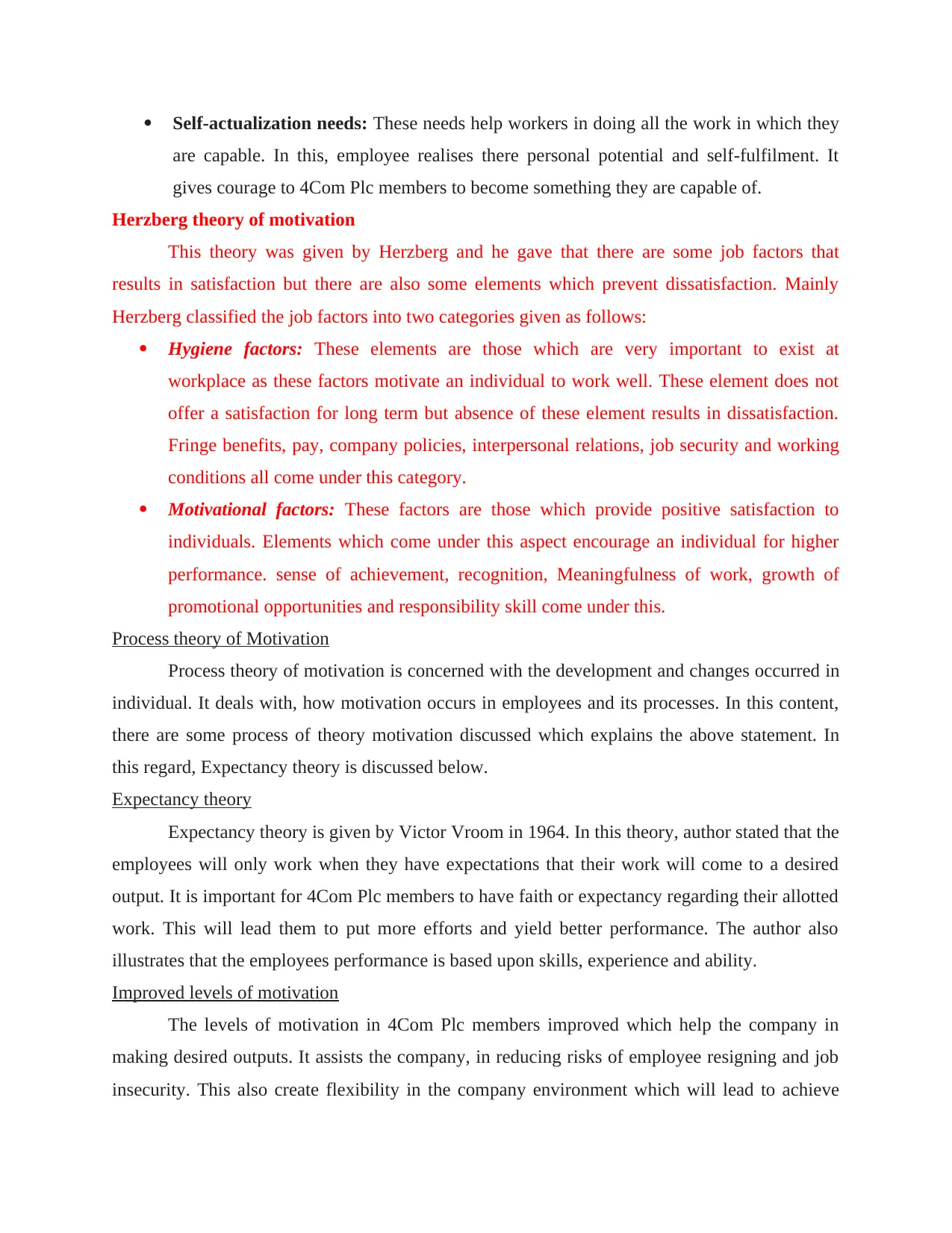
Self-actualization needs: These needs help workers in doing all the work in which they
are capable. In this, employee realises there personal potential and self-fulfilment. It
gives courage to 4Com Plc members to become something they are capable of.
Herzberg theory of motivation
This theory was given by Herzberg and he gave that there are some job factors that
results in satisfaction but there are also some elements which prevent dissatisfaction. Mainly
Herzberg classified the job factors into two categories given as follows:
Hygiene factors: These elements are those which are very important to exist at
workplace as these factors motivate an individual to work well. These element does not
offer a satisfaction for long term but absence of these element results in dissatisfaction.
Fringe benefits, pay, company policies, interpersonal relations, job security and working
conditions all come under this category.
Motivational factors: These factors are those which provide positive satisfaction to
individuals. Elements which come under this aspect encourage an individual for higher
performance. sense of achievement, recognition, Meaningfulness of work, growth of
promotional opportunities and responsibility skill come under this.
Process theory of Motivation
Process theory of motivation is concerned with the development and changes occurred in
individual. It deals with, how motivation occurs in employees and its processes. In this content,
there are some process of theory motivation discussed which explains the above statement. In
this regard, Expectancy theory is discussed below.
Expectancy theory
Expectancy theory is given by Victor Vroom in 1964. In this theory, author stated that the
employees will only work when they have expectations that their work will come to a desired
output. It is important for 4Com Plc members to have faith or expectancy regarding their allotted
work. This will lead them to put more efforts and yield better performance. The author also
illustrates that the employees performance is based upon skills, experience and ability.
Improved levels of motivation
The levels of motivation in 4Com Plc members improved which help the company in
making desired outputs. It assists the company, in reducing risks of employee resigning and job
insecurity. This also create flexibility in the company environment which will lead to achieve
are capable. In this, employee realises there personal potential and self-fulfilment. It
gives courage to 4Com Plc members to become something they are capable of.
Herzberg theory of motivation
This theory was given by Herzberg and he gave that there are some job factors that
results in satisfaction but there are also some elements which prevent dissatisfaction. Mainly
Herzberg classified the job factors into two categories given as follows:
Hygiene factors: These elements are those which are very important to exist at
workplace as these factors motivate an individual to work well. These element does not
offer a satisfaction for long term but absence of these element results in dissatisfaction.
Fringe benefits, pay, company policies, interpersonal relations, job security and working
conditions all come under this category.
Motivational factors: These factors are those which provide positive satisfaction to
individuals. Elements which come under this aspect encourage an individual for higher
performance. sense of achievement, recognition, Meaningfulness of work, growth of
promotional opportunities and responsibility skill come under this.
Process theory of Motivation
Process theory of motivation is concerned with the development and changes occurred in
individual. It deals with, how motivation occurs in employees and its processes. In this content,
there are some process of theory motivation discussed which explains the above statement. In
this regard, Expectancy theory is discussed below.
Expectancy theory
Expectancy theory is given by Victor Vroom in 1964. In this theory, author stated that the
employees will only work when they have expectations that their work will come to a desired
output. It is important for 4Com Plc members to have faith or expectancy regarding their allotted
work. This will lead them to put more efforts and yield better performance. The author also
illustrates that the employees performance is based upon skills, experience and ability.
Improved levels of motivation
The levels of motivation in 4Com Plc members improved which help the company in
making desired outputs. It assists the company, in reducing risks of employee resigning and job
insecurity. This also create flexibility in the company environment which will lead to achieve
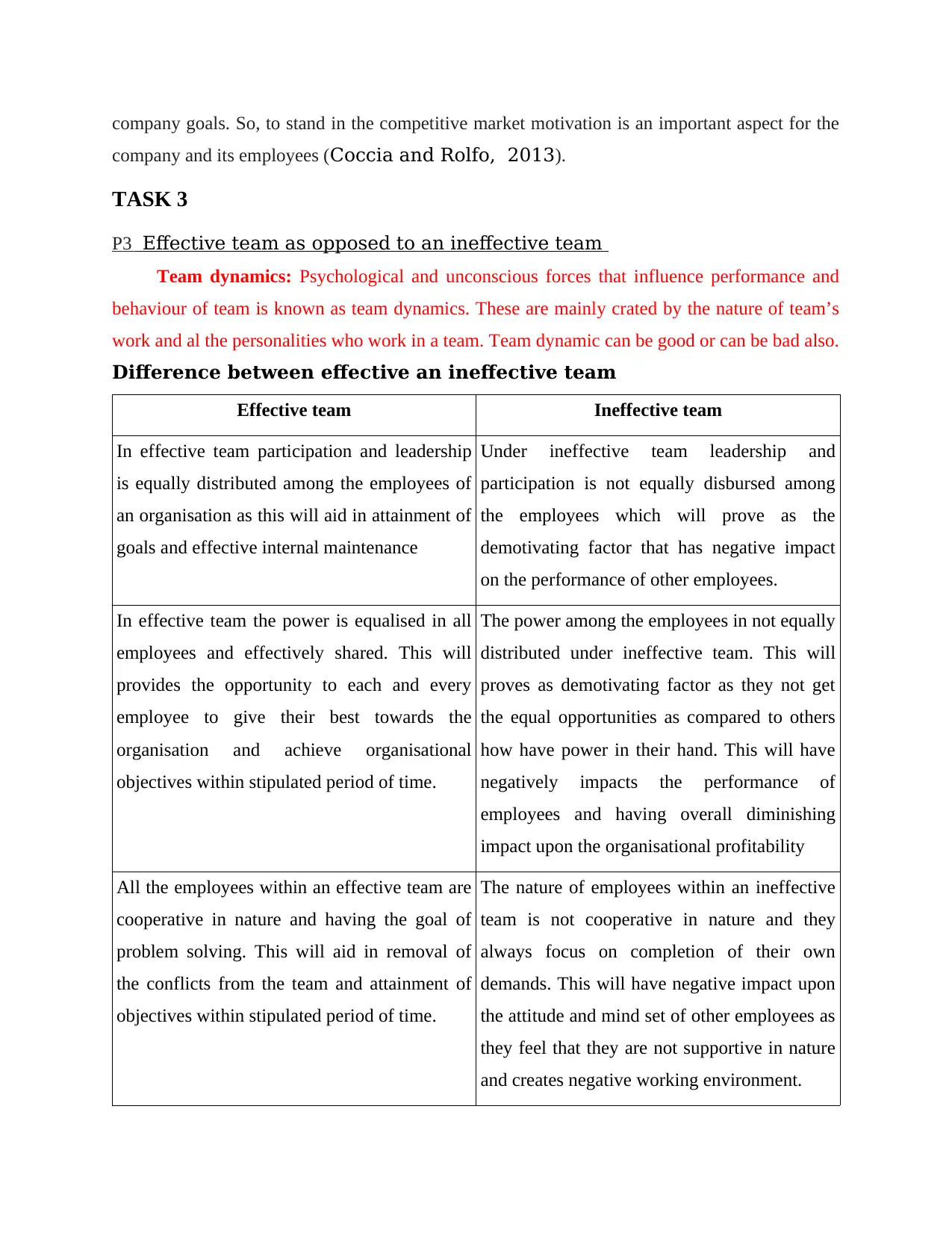
company goals. So, to stand in the competitive market motivation is an important aspect for the
company and its employees (Coccia and Rolfo, 2013).
TASK 3
P3 Effective team as opposed to an ineffective team
Team dynamics: Psychological and unconscious forces that influence performance and
behaviour of team is known as team dynamics. These are mainly crated by the nature of team’s
work and al the personalities who work in a team. Team dynamic can be good or can be bad also.
Difference between effective an ineffective team
Effective team Ineffective team
In effective team participation and leadership
is equally distributed among the employees of
an organisation as this will aid in attainment of
goals and effective internal maintenance
Under ineffective team leadership and
participation is not equally disbursed among
the employees which will prove as the
demotivating factor that has negative impact
on the performance of other employees.
In effective team the power is equalised in all
employees and effectively shared. This will
provides the opportunity to each and every
employee to give their best towards the
organisation and achieve organisational
objectives within stipulated period of time.
The power among the employees in not equally
distributed under ineffective team. This will
proves as demotivating factor as they not get
the equal opportunities as compared to others
how have power in their hand. This will have
negatively impacts the performance of
employees and having overall diminishing
impact upon the organisational profitability
All the employees within an effective team are
cooperative in nature and having the goal of
problem solving. This will aid in removal of
the conflicts from the team and attainment of
objectives within stipulated period of time.
The nature of employees within an ineffective
team is not cooperative in nature and they
always focus on completion of their own
demands. This will have negative impact upon
the attitude and mind set of other employees as
they feel that they are not supportive in nature
and creates negative working environment.
company and its employees (Coccia and Rolfo, 2013).
TASK 3
P3 Effective team as opposed to an ineffective team
Team dynamics: Psychological and unconscious forces that influence performance and
behaviour of team is known as team dynamics. These are mainly crated by the nature of team’s
work and al the personalities who work in a team. Team dynamic can be good or can be bad also.
Difference between effective an ineffective team
Effective team Ineffective team
In effective team participation and leadership
is equally distributed among the employees of
an organisation as this will aid in attainment of
goals and effective internal maintenance
Under ineffective team leadership and
participation is not equally disbursed among
the employees which will prove as the
demotivating factor that has negative impact
on the performance of other employees.
In effective team the power is equalised in all
employees and effectively shared. This will
provides the opportunity to each and every
employee to give their best towards the
organisation and achieve organisational
objectives within stipulated period of time.
The power among the employees in not equally
distributed under ineffective team. This will
proves as demotivating factor as they not get
the equal opportunities as compared to others
how have power in their hand. This will have
negatively impacts the performance of
employees and having overall diminishing
impact upon the organisational profitability
All the employees within an effective team are
cooperative in nature and having the goal of
problem solving. This will aid in removal of
the conflicts from the team and attainment of
objectives within stipulated period of time.
The nature of employees within an ineffective
team is not cooperative in nature and they
always focus on completion of their own
demands. This will have negative impact upon
the attitude and mind set of other employees as
they feel that they are not supportive in nature
and creates negative working environment.
⊘ This is a preview!⊘
Do you want full access?
Subscribe today to unlock all pages.

Trusted by 1+ million students worldwide
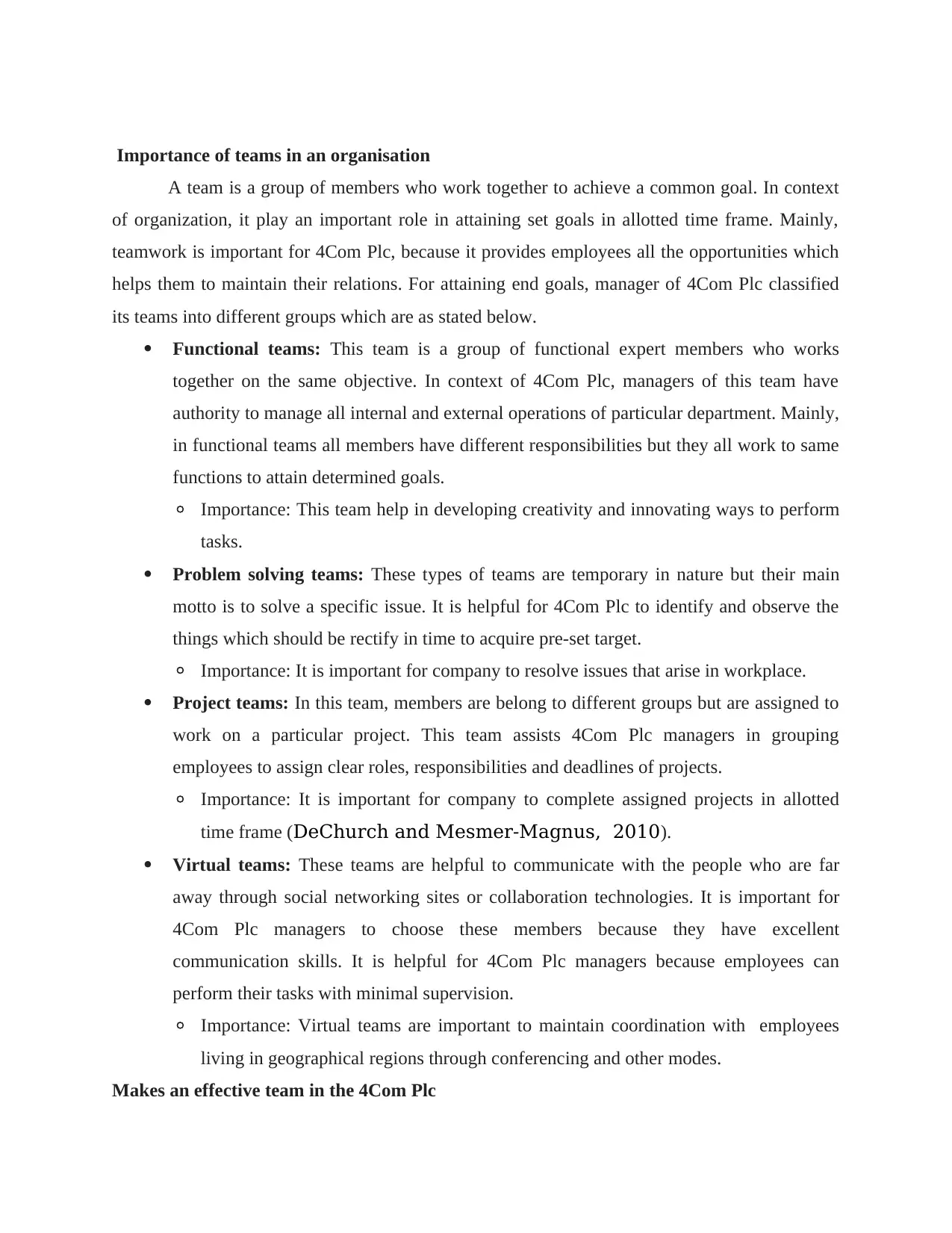
Importance of teams in an organisation
A team is a group of members who work together to achieve a common goal. In context
of organization, it play an important role in attaining set goals in allotted time frame. Mainly,
teamwork is important for 4Com Plc, because it provides employees all the opportunities which
helps them to maintain their relations. For attaining end goals, manager of 4Com Plc classified
its teams into different groups which are as stated below.
Functional teams: This team is a group of functional expert members who works
together on the same objective. In context of 4Com Plc, managers of this team have
authority to manage all internal and external operations of particular department. Mainly,
in functional teams all members have different responsibilities but they all work to same
functions to attain determined goals.
◦ Importance: This team help in developing creativity and innovating ways to perform
tasks.
Problem solving teams: These types of teams are temporary in nature but their main
motto is to solve a specific issue. It is helpful for 4Com Plc to identify and observe the
things which should be rectify in time to acquire pre-set target.
◦ Importance: It is important for company to resolve issues that arise in workplace.
Project teams: In this team, members are belong to different groups but are assigned to
work on a particular project. This team assists 4Com Plc managers in grouping
employees to assign clear roles, responsibilities and deadlines of projects.
◦ Importance: It is important for company to complete assigned projects in allotted
time frame (DeChurch and Mesmer-Magnus, 2010).
Virtual teams: These teams are helpful to communicate with the people who are far
away through social networking sites or collaboration technologies. It is important for
4Com Plc managers to choose these members because they have excellent
communication skills. It is helpful for 4Com Plc managers because employees can
perform their tasks with minimal supervision.
◦ Importance: Virtual teams are important to maintain coordination with employees
living in geographical regions through conferencing and other modes.
Makes an effective team in the 4Com Plc
A team is a group of members who work together to achieve a common goal. In context
of organization, it play an important role in attaining set goals in allotted time frame. Mainly,
teamwork is important for 4Com Plc, because it provides employees all the opportunities which
helps them to maintain their relations. For attaining end goals, manager of 4Com Plc classified
its teams into different groups which are as stated below.
Functional teams: This team is a group of functional expert members who works
together on the same objective. In context of 4Com Plc, managers of this team have
authority to manage all internal and external operations of particular department. Mainly,
in functional teams all members have different responsibilities but they all work to same
functions to attain determined goals.
◦ Importance: This team help in developing creativity and innovating ways to perform
tasks.
Problem solving teams: These types of teams are temporary in nature but their main
motto is to solve a specific issue. It is helpful for 4Com Plc to identify and observe the
things which should be rectify in time to acquire pre-set target.
◦ Importance: It is important for company to resolve issues that arise in workplace.
Project teams: In this team, members are belong to different groups but are assigned to
work on a particular project. This team assists 4Com Plc managers in grouping
employees to assign clear roles, responsibilities and deadlines of projects.
◦ Importance: It is important for company to complete assigned projects in allotted
time frame (DeChurch and Mesmer-Magnus, 2010).
Virtual teams: These teams are helpful to communicate with the people who are far
away through social networking sites or collaboration technologies. It is important for
4Com Plc managers to choose these members because they have excellent
communication skills. It is helpful for 4Com Plc managers because employees can
perform their tasks with minimal supervision.
◦ Importance: Virtual teams are important to maintain coordination with employees
living in geographical regions through conferencing and other modes.
Makes an effective team in the 4Com Plc
Paraphrase This Document
Need a fresh take? Get an instant paraphrase of this document with our AI Paraphraser
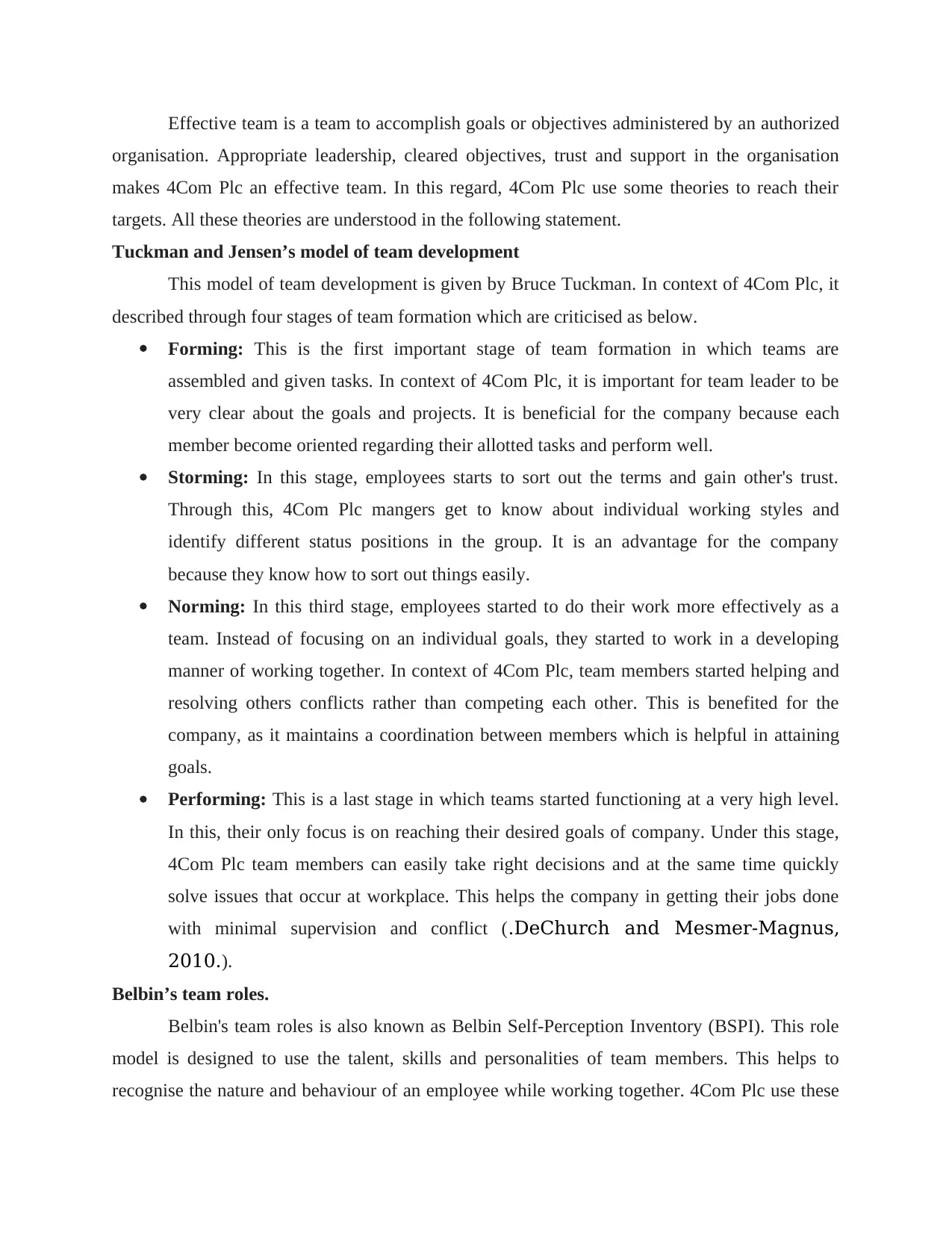
Effective team is a team to accomplish goals or objectives administered by an authorized
organisation. Appropriate leadership, cleared objectives, trust and support in the organisation
makes 4Com Plc an effective team. In this regard, 4Com Plc use some theories to reach their
targets. All these theories are understood in the following statement.
Tuckman and Jensen’s model of team development
This model of team development is given by Bruce Tuckman. In context of 4Com Plc, it
described through four stages of team formation which are criticised as below.
Forming: This is the first important stage of team formation in which teams are
assembled and given tasks. In context of 4Com Plc, it is important for team leader to be
very clear about the goals and projects. It is beneficial for the company because each
member become oriented regarding their allotted tasks and perform well.
Storming: In this stage, employees starts to sort out the terms and gain other's trust.
Through this, 4Com Plc mangers get to know about individual working styles and
identify different status positions in the group. It is an advantage for the company
because they know how to sort out things easily.
Norming: In this third stage, employees started to do their work more effectively as a
team. Instead of focusing on an individual goals, they started to work in a developing
manner of working together. In context of 4Com Plc, team members started helping and
resolving others conflicts rather than competing each other. This is benefited for the
company, as it maintains a coordination between members which is helpful in attaining
goals.
Performing: This is a last stage in which teams started functioning at a very high level.
In this, their only focus is on reaching their desired goals of company. Under this stage,
4Com Plc team members can easily take right decisions and at the same time quickly
solve issues that occur at workplace. This helps the company in getting their jobs done
with minimal supervision and conflict (.DeChurch and Mesmer-Magnus,
2010.).
Belbin’s team roles.
Belbin's team roles is also known as Belbin Self-Perception Inventory (BSPI). This role
model is designed to use the talent, skills and personalities of team members. This helps to
recognise the nature and behaviour of an employee while working together. 4Com Plc use these
organisation. Appropriate leadership, cleared objectives, trust and support in the organisation
makes 4Com Plc an effective team. In this regard, 4Com Plc use some theories to reach their
targets. All these theories are understood in the following statement.
Tuckman and Jensen’s model of team development
This model of team development is given by Bruce Tuckman. In context of 4Com Plc, it
described through four stages of team formation which are criticised as below.
Forming: This is the first important stage of team formation in which teams are
assembled and given tasks. In context of 4Com Plc, it is important for team leader to be
very clear about the goals and projects. It is beneficial for the company because each
member become oriented regarding their allotted tasks and perform well.
Storming: In this stage, employees starts to sort out the terms and gain other's trust.
Through this, 4Com Plc mangers get to know about individual working styles and
identify different status positions in the group. It is an advantage for the company
because they know how to sort out things easily.
Norming: In this third stage, employees started to do their work more effectively as a
team. Instead of focusing on an individual goals, they started to work in a developing
manner of working together. In context of 4Com Plc, team members started helping and
resolving others conflicts rather than competing each other. This is benefited for the
company, as it maintains a coordination between members which is helpful in attaining
goals.
Performing: This is a last stage in which teams started functioning at a very high level.
In this, their only focus is on reaching their desired goals of company. Under this stage,
4Com Plc team members can easily take right decisions and at the same time quickly
solve issues that occur at workplace. This helps the company in getting their jobs done
with minimal supervision and conflict (.DeChurch and Mesmer-Magnus,
2010.).
Belbin’s team roles.
Belbin's team roles is also known as Belbin Self-Perception Inventory (BSPI). This role
model is designed to use the talent, skills and personalities of team members. This helps to
recognise the nature and behaviour of an employee while working together. 4Com Plc use these
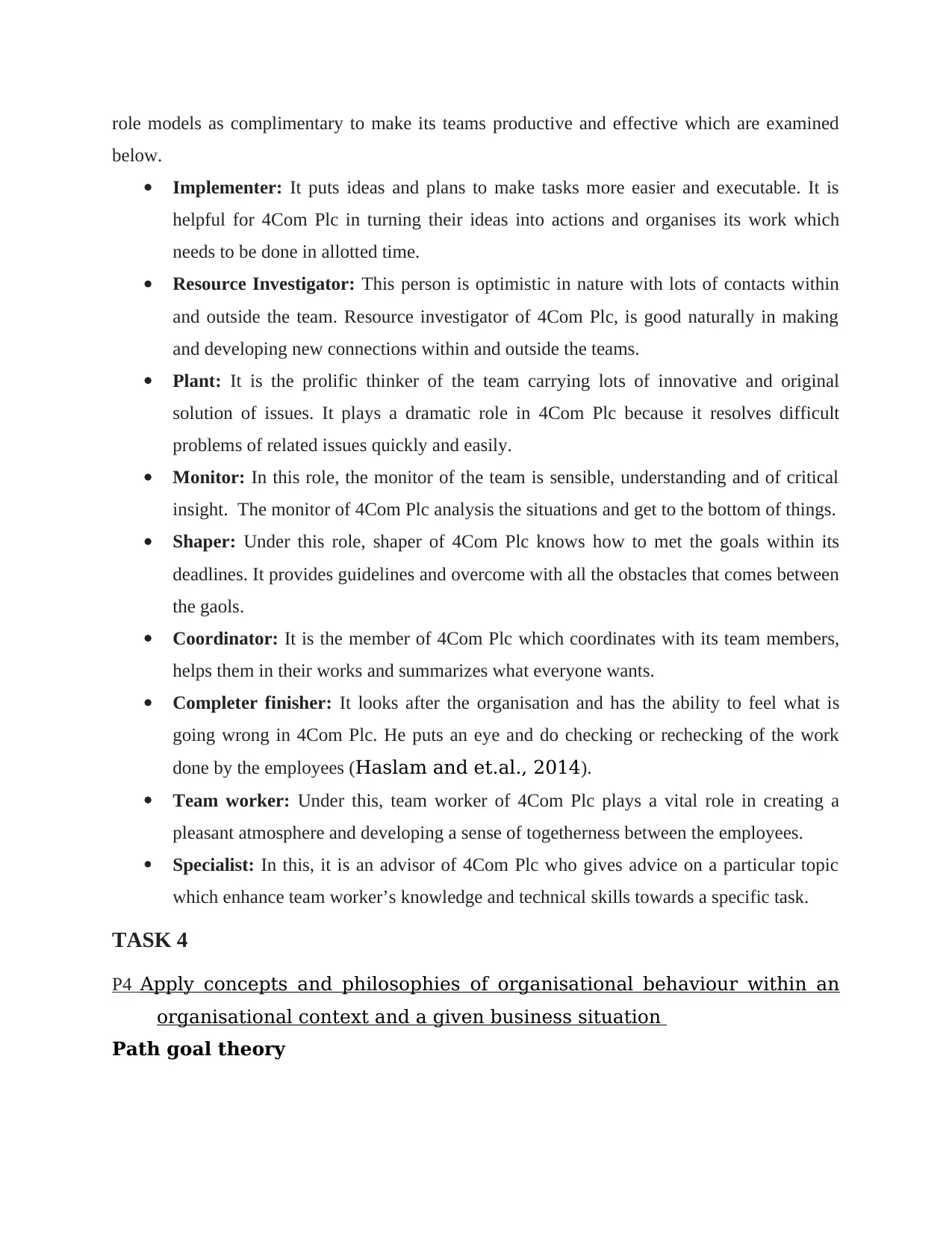
role models as complimentary to make its teams productive and effective which are examined
below.
Implementer: It puts ideas and plans to make tasks more easier and executable. It is
helpful for 4Com Plc in turning their ideas into actions and organises its work which
needs to be done in allotted time.
Resource Investigator: This person is optimistic in nature with lots of contacts within
and outside the team. Resource investigator of 4Com Plc, is good naturally in making
and developing new connections within and outside the teams.
Plant: It is the prolific thinker of the team carrying lots of innovative and original
solution of issues. It plays a dramatic role in 4Com Plc because it resolves difficult
problems of related issues quickly and easily.
Monitor: In this role, the monitor of the team is sensible, understanding and of critical
insight. The monitor of 4Com Plc analysis the situations and get to the bottom of things.
Shaper: Under this role, shaper of 4Com Plc knows how to met the goals within its
deadlines. It provides guidelines and overcome with all the obstacles that comes between
the gaols.
Coordinator: It is the member of 4Com Plc which coordinates with its team members,
helps them in their works and summarizes what everyone wants.
Completer finisher: It looks after the organisation and has the ability to feel what is
going wrong in 4Com Plc. He puts an eye and do checking or rechecking of the work
done by the employees (Haslam and et.al., 2014).
Team worker: Under this, team worker of 4Com Plc plays a vital role in creating a
pleasant atmosphere and developing a sense of togetherness between the employees.
Specialist: In this, it is an advisor of 4Com Plc who gives advice on a particular topic
which enhance team worker’s knowledge and technical skills towards a specific task.
TASK 4
P4 Apply concepts and philosophies of organisational behaviour within an
organisational context and a given business situation
Path goal theory
below.
Implementer: It puts ideas and plans to make tasks more easier and executable. It is
helpful for 4Com Plc in turning their ideas into actions and organises its work which
needs to be done in allotted time.
Resource Investigator: This person is optimistic in nature with lots of contacts within
and outside the team. Resource investigator of 4Com Plc, is good naturally in making
and developing new connections within and outside the teams.
Plant: It is the prolific thinker of the team carrying lots of innovative and original
solution of issues. It plays a dramatic role in 4Com Plc because it resolves difficult
problems of related issues quickly and easily.
Monitor: In this role, the monitor of the team is sensible, understanding and of critical
insight. The monitor of 4Com Plc analysis the situations and get to the bottom of things.
Shaper: Under this role, shaper of 4Com Plc knows how to met the goals within its
deadlines. It provides guidelines and overcome with all the obstacles that comes between
the gaols.
Coordinator: It is the member of 4Com Plc which coordinates with its team members,
helps them in their works and summarizes what everyone wants.
Completer finisher: It looks after the organisation and has the ability to feel what is
going wrong in 4Com Plc. He puts an eye and do checking or rechecking of the work
done by the employees (Haslam and et.al., 2014).
Team worker: Under this, team worker of 4Com Plc plays a vital role in creating a
pleasant atmosphere and developing a sense of togetherness between the employees.
Specialist: In this, it is an advisor of 4Com Plc who gives advice on a particular topic
which enhance team worker’s knowledge and technical skills towards a specific task.
TASK 4
P4 Apply concepts and philosophies of organisational behaviour within an
organisational context and a given business situation
Path goal theory
⊘ This is a preview!⊘
Do you want full access?
Subscribe today to unlock all pages.

Trusted by 1+ million students worldwide
1 out of 16
Related Documents
Your All-in-One AI-Powered Toolkit for Academic Success.
+13062052269
info@desklib.com
Available 24*7 on WhatsApp / Email
![[object Object]](/_next/static/media/star-bottom.7253800d.svg)
Unlock your academic potential
Copyright © 2020–2026 A2Z Services. All Rights Reserved. Developed and managed by ZUCOL.





